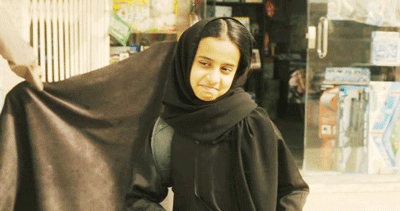Five Recent Films Which Prove You Have To Bend The Rules To Make Great Cinema
Viewers seem to be craving films that bring them something new, and filmmakers are finding all sorts of new ways to tell their stories. Here's some of the best.


Brought to you by HP
We’re partnering with the HP Future Filmmakers competition to take a look at the winners, their stories, and topics that matter to aspiring filmmakers and movie fans.
–
At this year’s Oscars, some of the most successful films included a superhero movie about mental illness that presented itself as one long take, a “jazz thriller”, and a fairly conventional albeit masterful drama that gave you the unprecedented opportunity to watch a family age over 12 years on screen. Meanwhile, our latest favourite flick of the past few months is the fourth instalment of a famous dystopian action series for rev-heads, which is being celebrated by women around the world and heralded as “the wildest filmic utopia in decades”.
What. Is. Happening.

The new Love Actually? Sure, why not.
Now more than ever, viewers seem to be craving films that bring them something new — and filmmakers are finding all sorts of new ways to tell their stories. This can involve breaking generic conventions to challenge an audience’s expectations, playing with the form itself to deliver meaning in different ways, or embracing new technology.
Innovation — even if it does involve us getting headaches while wearing shitty 3D glasses — is always interesting.
To see how all this works in action, we talked to the five finalists of HP’s Future Filmmakers competition about their favourite films of the past decade. Having just created their own works that “bend the rules”, here’s a taste of the other bad-ass and oddball films that inspired them along the way.
–
No Country For Old Men (2007), dir. Joel and Ethan Coen
Picked by: Mitch Kennedy (Talk The Walk)
“In the thriller and mystery genres, the musical score play a vital role in manipulating the audience, but in this Coen Brothers’ masterpiece there’s virtually no music whatsoever,” Kennedy says. “Through brilliant direction and subtle storytelling choices, the film cleverly guides our attention to focus on particular diegetic sounds that do the job of holding suspense in lieu of music.
“You can really see all that when Javier Bardem’s character commits his first on-screen murder, choking a deputy with his handcuffed wrists. As his legs scramble desperately against the floor, the screeching of rubber-soled boots cuts through the air, and the rumbling of a nearby train adds to the eerie atmosphere. It all perfectly reflects the cold and violent nature of Bardem’s character.”
–
Under The Skin (2014), dir. Jonathan Glazer
Picked by: Edward John Drake (The First Fires of Outliers)
“2014 was a hell of a year for bending rules, because film-makers were being forced to respond to the superhero-overload-itis consuming our screens,” Edward John Drake says. “After Man Of Steel, Captain America and Thor, we were given three worthy heirs to the throne of the anti-hero: Dan Gilroy’s Louis “Machiavelli” Bloom in Nightcrawler, Alejandro González Iñárritu reincarnated Rigger Thompson in Birdman, and an alien struggling to find humanity in Under The Skin.
“This film washes over you, washes through you, and then leaves your emotions out to dry in the cold Scottish sun. What is it? What does it mean? We’re obsessed with trick endings and twists that leave you with a fun conversation starter, but this is something more raw. Jonathan Glazer’s film comes from an opaque place many filmmakers are ignoring — the damn heart.”
Bonus picks: “Monsters — a film that Gareth Edwards willed into existence on a budget of less than £500,000 — and Mad Max: Fury Road. [In terms of rule-bending film history] everything changed after the release of Seven Samurai, The Apartment, 2001 A Space Odyssey, Star Wars — and after a third viewing in as many weeks, I feel confident in adding George Miller’s inimitable (and subversive) fourth Mad Max to that list.”
–
Submarine (2010), dir. Richard Ayoade
Picked by: Toby Morris (The Time Tube)
“My favourite film of the last decade, Submarine is hilarious, heartbreaking and incredibly affecting. For what is essentially a rom-com, it breaks all sorts of generic conventions in order to create something way more powerful. The film — Ayoade’s directorial debut — is like Spike Jonze had a baby with Wes Anderson, while having an affair with Michel Gondry. You’re not sure who the father is but it doesn’t matter because it’s incredible.”
“When I first saw it I had no idea what to expect, but was quickly completely blown away by the creativity, humour and heart of this story about a weird little English kid’s experience of teenage love. In an age where so many films are carbon copies, the ingenuity of Submarine‘s execution make it a potent reminder of the power of cinema, and it’s all capped off by one of the most perfect endings I’ve ever seen.
“Also, the soundtrack is by Alex Turner of The Arctic Monkeys. So that helps.”
–
There Will Be Blood (2007), dir. Paul Thomas Anderson
Picked by: Joel Kohn (Processed)
“A hard-nosed, gritty look at an oil tycoon going from rags to riches in the Old West; this film is bleak, beautifully shot and unlike most of modern American cinema,” Kohn says. “Throwing away many of the familiar tropes of modern filmmaking like fast cutting and flashy camera work, the film takes it slow letting us spend time with the anti-hero Daniel Plainview as he slowly brings about his own demise.”
Bonus picks: “Moonrise Kingdom and Grand Budapest Hotel because Wes Anderson’s fairytale world is unlike anything else in cinema. Wall-E and Up which both start with ten-minute sequences that have NO DIALOGUE. And Michel Gondry’s Eternal Sunshine of the Spotless Mind, for its incredible visual artistry and disjointed structure. I find something new every time I watch it.”
–
Wadjda (2012), dir. Haifaa Al-Mansour
Picked by: Jen Farrow (Mel and Rana)
“Filmed on location in Saudi Arabia by the first-ever female Saudi director, Wadjda follows the story of a ten-year-old girl, who has aspirations of buying a bicycle in a conservative society that doesn’t approve of women riding bikes,” Farrow says. “This film didn’t simply depart from convention; it was literally all about bending the rules.”
“Much like her character, director Haifaa Al-Mansour faced enormous barriers because of her gender. She wasn’t able to work with her crew in public and was concealed in a van, communicating via walkie-talkie. It was also the first film shot entirely in Saudi Arabia, where public cinemas have been illegal since the 1980s.”

–
Vote in HP’s Future Filmmakers competition, to help your favourite filmmaker win a cash grant — and come up with taglines for the finalists’ films in the #HPTagIt competition, and you could score great prizes too, including a $5,000 Flight Centre voucher. Head here to get involved (and for T&Cs).
–
Amy Scott is a writer from Melbourne.

Brought to you by HP

